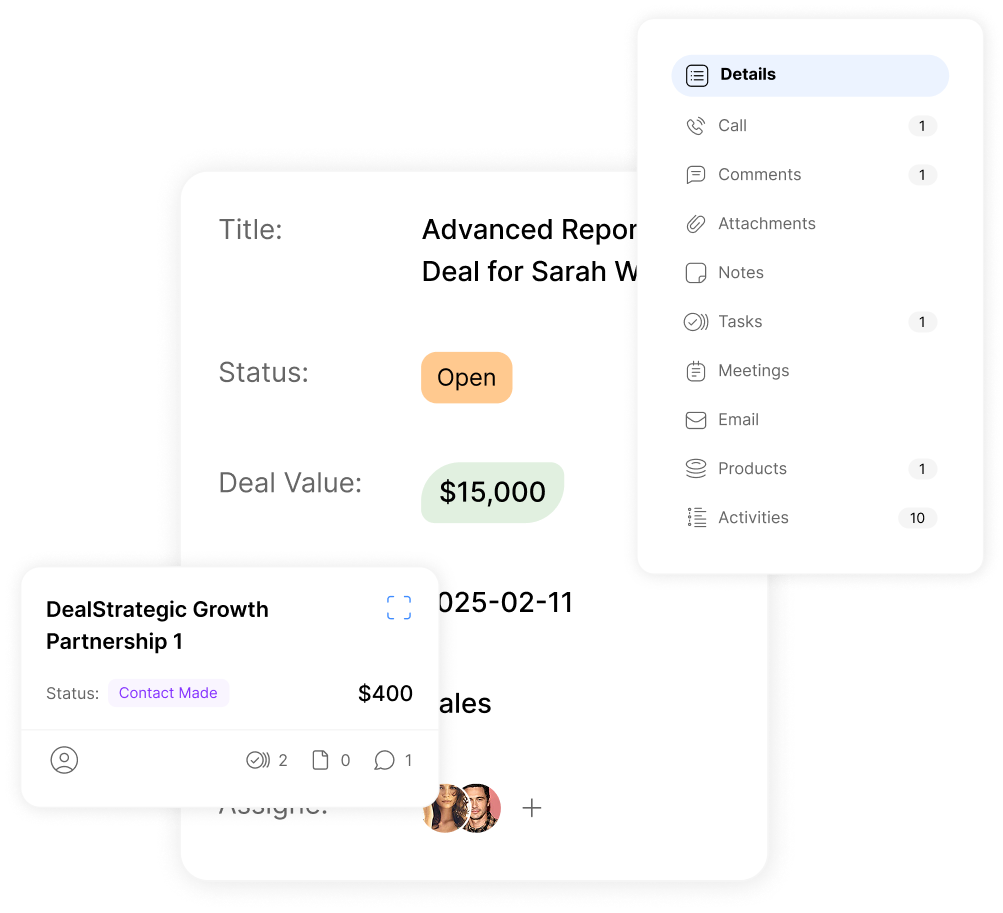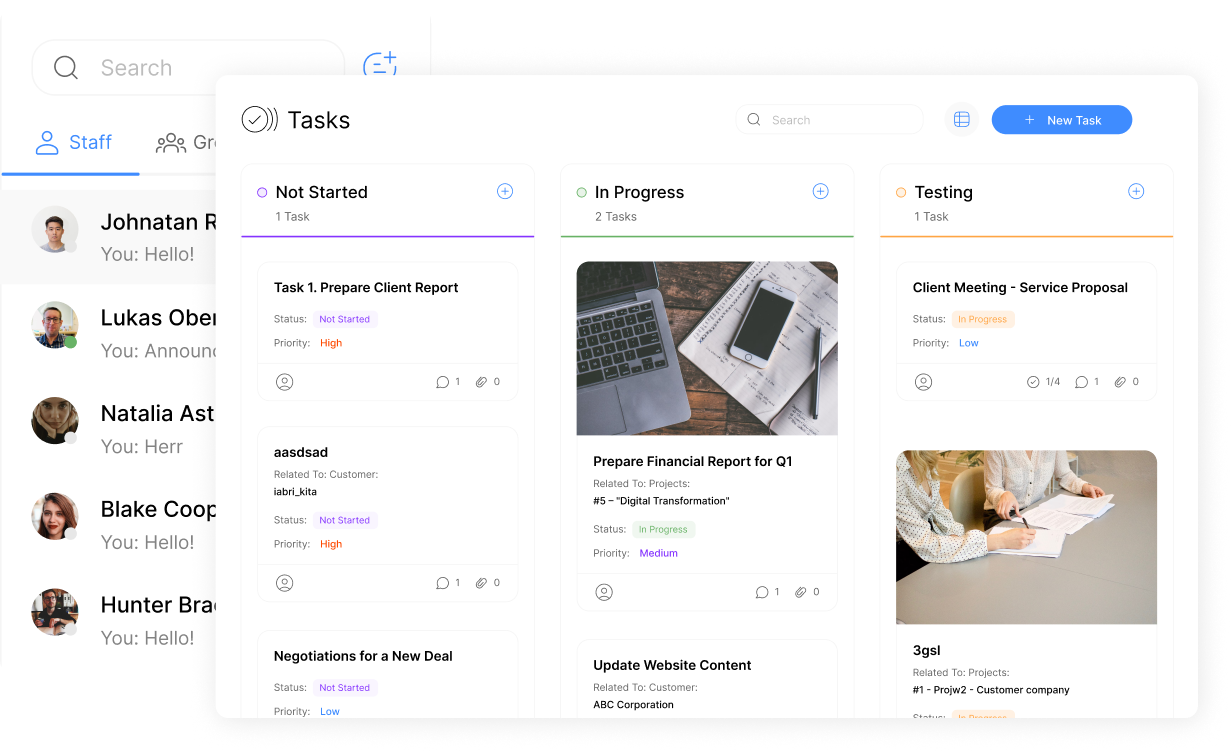CRM Tool adoption is crucial for modern businesses—especially when you’re a startup founder juggling spreadsheets, sticky notes, and a flooded inbox, trying to keep track of leads, customers, and follow-ups. Sound familiar? It’s the kind of chaos that can stall growth before it even starts. That’s why using a CRM Tool is a game-changer—it transforms scattered data into streamlined success through effective customer management.
However, with so many CRM Tools available, how do you pick the right one for your business? Strong customer management features within the right tool can help you decide wisely.
Welcome to The Ultimate Guide to Top CRM Tools – Which One Is Right for You? Whether you’re a solo entrepreneur or leading a growing team, we’ve got you covered with everything you need to know about choosing the best CRM Tool—from what it does, to how it works, to making it align with your unique business goals. At ClearCRM, we’re passionate about simplifying customer relationships and improving customer management—and the right CRM Tool is the first step.

What Is a CRM Tool, Anyway?
At its core, a CRM tool is software that helps businesses manage interactions with customers, prospects, and leads through effective customer management. Think of it as your digital command center—a single place to store contact details, track sales pipelines, automate tasks, and uncover insights that drive growth in customer management.
From handwritten Rolodexes to today’s AI-powered platforms, CRM tools have evolved to meet the demands of modern businesses focusing on streamlined customer management.
But here’s the kicker: not all CRMs are created equal. Some focus on sales automation, others on analytics, and a few—like ClearCRM—aim to simplify the whole experience without overwhelming you with complexity in customer management.
So, let’s dive into why they matter and how to find the right one for your customer management needs.
Why Your Startup Needs a CRM Tool
A CRM isn’t just a nice-to-have—it’s a growth engine for superior customer management. Here’s why:
Centralized Data – No more digging through emails, Slack threads, or spreadsheets—everything about your customers lives in one spot, accessible to your whole team, enhancing customer management.
Better Relationships – Track every call, email, and meeting to personalize your outreach and build trust. A client mentions they love coffee? Next time, you can ask about their latest brew, all thanks to robust customer management features.
Time Savings – Automate repetitive tasks like sending follow-up emails or scheduling calls, freeing you up to focus on strategy and closing deals, improving overall customer management.
Growth Insights – Spot trends (like which leads convert fastest), measure performance, and make data-driven decisions to fuel your next move in customer management.

Types of CRM Tools: What’s Out There?
CRM tools come in different flavors, each suited to specific needs. Specifically, these include:- Operational CRMs: Streamline daily tasks like lead management and email campaigns. Examples: HubSpot, Pipedrive.
- Analytical CRMs: Dig into data for insights on customer behavior. Examples: Salesforce, Zoho CRM.
- Collaborative CRMs: Align teams with shared access to customer info. Examples: Monday CRM, ClearCRM.
Top 5 CRM Tools for Small Businesses in 2025
Choosing the right CRM is essential for small businesses looking to streamline operations, manage customer relationships, and boost sales. In 2025, several CRM tools stand out for their affordability, ease of use, and powerful automation capabilities. Therefore, here are the top five CRM tools for small businesses that offer the best features, customization, and overall value.1. ClearCRM – Best All-in-One CRM for Small Businesses
Why Choose ClearCRM?
ClearCRM is designed for small businesses that need a simple yet powerful CRM without the complexity of enterprise-grade tools. It seamlessly combines sales, marketing, and project management into a single platform with an intuitive, no-code interface. Moreover, it’s built to grow with your business—offering automation, scalability, and robust customer management features.
Key Features:
- Firstly, No-Code Automation – Automate repetitive tasks like follow-ups and lead tracking.
- Secondly, Integrated Email & Campaign Management – Run marketing campaigns within the CRM.
- Additionally, Customer Support Tools – Includes chatbot integration and a ticketing system.
- Moreover, Project & Workflow Automation – Manage tasks and streamline workflows efficiently.
Potential Drawbacks:
- However, Newer Platform – Still gaining recognition in the CRM market.
- On the downside, Limited Third-Party Integrations – Works well on its own but has fewer integrations than older CRMs.
Best For:
Startups and small businesses looking for an affordable, all-in-one CRM with built-in automation.
2. Pipedrive – Best CRM for Sales Teams
Why Choose Pipedrive?
To put it simply, Pipedrive is a sales-driven CRM designed to help small businesses close deals faster. Its visual sales pipeline and automation features make it a favorite among sales teams.
Key Features:
- Notably, Pipeline Management – A simple drag-and-drop interface for tracking sales progress.
- In addition, Sales Automation – Automate repetitive tasks like email follow-ups and reminders.
- Furthermore, Performance Tracking – Get detailed analytics on sales performance.
Potential Drawbacks:
- Unfortunately, Limited Marketing Tools – Focuses on sales rather than marketing automation.
- Also, No Built-in Customer Support – Lacks features like helpdesk or ticketing systems.
Best For:
Small businesses with dedicated sales teams needing a visual pipeline to track leads and deals.
3. Insightly – Best CRM for Small Business Project Management
Why Choose Insightly?
Importantly, Insightly is a CRM and project management hybrid, making it ideal for small businesses that need to manage customer relationships while handling projects.
Key Features:
- For example, Project Tracking – Convert sales opportunities into projects seamlessly.
- Additionally, Workflow Automation – Automate tasks such as email alerts and record updates.
- Equally important, Integrations – Works with G Suite, Microsoft 365, QuickBooks, and more.
Potential Drawbacks:
- Still, Limited Customization – Not as flexible as other CRMs for advanced sales processes.
- Moreover, Slower Performance on Large Databases – Best for smaller teams with fewer records.
Best For:
Service-based businesses needing a CRM with built-in project management.
4. Flowlu – Best CRM for Finance & Business Management
Why Choose Flowlu?
In short, Flowlu goes beyond traditional CRMs by combining sales, finance, and business management tools in one platform, making it great for businesses that need financial oversight.
Key Features:
- Specifically, Financial & Invoice Management – Track cash flow, send invoices, and manage budgets.
- Next, Sales & Project Tracking – Manage both client relationships and ongoing projects.
- Additionally, Collaboration Tools – Includes task management and team collaboration features.
Potential Drawbacks:
- However, Overwhelming for Small Teams – Has many features that smaller teams may not need.
- Also, Limited Mobile Experience – The mobile app isn’t as intuitive as competitors’.
Best For:
Small businesses needing CRM, finance, and project management tools in one place.
5. Close – Best CRM for Remote & Inside Sales Teams
Why Choose Close?
Clearly, Close is a CRM built specifically for inside sales teams that rely on calling, emailing, and follow-ups to close deals efficiently.
Key Features:
- For instance, Built-in Calling & SMS – Make and track calls directly from the CRM.
- Moreover, Email & Workflow Automation – Automate follow-ups and outreach campaigns.
- In particular, Powerful Reporting & Sales Insights – Get detailed insights into sales performance.
Potential Drawbacks:
- To clarify, Not Ideal for In-Person Sales – Best for businesses that rely on digital communication.
- Also, No Free Plan – Higher entry cost compared to some competitors.
Best For:
Remote or inside sales teams needing built-in calling and email automation.
CRM Tool Comparison Table
CRM Tool | CRM (Customer Management) | Marketing (Growth Acceleration) | Services (Seamless Support) | Projects (Workflow Optimization) |
ClearCRM | Easy-to-use, no-code automation | Integrated email & campaign management | Customer ticketing & chatbot integration | Built-in task & workflow automation |
Pipedrive | Sales pipeline-focused CRM | Limited marketing tools | No dedicated support tools | No project management features |
Insightly | Contact & opportunity management | Email templates & tracking | Basic customer support | Project tracking & workflow automation |
Flowlu | Sales pipeline & finance tracking | Lead nurturing & campaign tools | Client portal & invoicing | Task & project management tools |
Close | Inside sales & remote team CRM | Built-in calling & email automation | Call tracking & sales performance tools | No dedicated project management tools |

1. Salesforce – Best for Scalability & Customization
Why Choose Salesforce?
To begin with, Salesforce is the most powerful and widely used enterprise CRM, offering deep customization, AI-powered analytics, and extensive third-party integrations.
Key Features:
- AI-Driven Insights – For example, predictive analytics and automation through Salesforce Einstein AI.
- Endless Customization – In addition, build workflows, dashboards, and automation to fit any business need.
- Enterprise-Level Security & Compliance – Furthermore, meets industry standards for data security.
Potential Drawbacks:
- Expensive – However, pricing scales up quickly with add-ons.
- Steep Learning Curve – As a result, requires training to maximize its capabilities.
Best For:
Large enterprises needing scalability, AI-powered analytics, and deep customization.
2. HubSpot CRM (Enterprise Plan) – Best for Marketing & Sales Automation
Why Choose HubSpot Enterprise?
Moreover, HubSpot combines CRM, sales, and marketing automation in one platform, making it ideal for enterprises that need an integrated approach.
Key Features:
- Advanced Marketing & Sales Automation – This includes email workflows, lead scoring, and personalized customer journeys.
- Powerful Reporting & Analytics – In particular, in-depth sales and marketing performance insights.
- Scalable for Growing Businesses – Consequently, you can easily upgrade as your business needs evolve.
Potential Drawbacks:
- Premium Features Are Expensive – That is to say, enterprise plans start at a high price point.
- Customization Limitations – Compared to Salesforce, it’s not as flexible for complex workflows.
Best For:
Mid-to-large enterprises wanting a powerful CRM with integrated marketing automation.
3. Zoho CRM Plus – Best for AI-Powered Sales & Omnichannel Support
Why Choose Zoho CRM Plus?
As an alternative to more expensive CRMs, Zoho CRM Plus offers an AI-powered, omnichannel CRM at a lower cost than many enterprise competitors, making it an excellent choice.
Key Features:
- AI-Powered Sales Assistant (Zia) – Specifically, predicts sales trends and automates tasks.
- Omnichannel Communication – For instance, manage emails, calls, social media, and live chat in one platform.
- Seamless Integration with Zoho Ecosystem – Additionally, connects with Zoho Books, Zoho Desk, and other tools.
Potential Drawbacks:
- Interface Can Feel Outdated – Nevertheless, the features remain powerful.
- Limited Third-Party Integrations – As a result, works best within the Zoho ecosystem.
Best For:
Enterprises looking for an AI-powered CRM with omnichannel support at a competitive price.
4. Oracle CRM – Best for Large Enterprises with Complex Needs
Why Choose Oracle CRM?
Notably, Oracle CRM is designed for enterprises that require deep data analytics, AI-powered automation, and strong security features.
Key Features:
- AI-Driven Customer Insights – That is to say, it uses machine learning for advanced analytics.
- Enterprise-Grade Security – Ensures compliance with global data regulations.
- Scalable for Global Businesses – Therefore, it handles multi-region operations with ease.
Potential Drawbacks:
- Complex Setup – For this reason, it requires IT expertise for implementation.
- High Cost – Including expensive licensing and maintenance fees.
Best For:
Large organizations needing advanced analytics, automation, and global scalability.
5. SAP CRM – Best for Enterprises Using SAP ERP
Why Choose SAP CRM?
In short, SAP CRM is ideal for companies already using SAP’s ERP system, offering seamless integration for end-to-end business management.
Key Features:
- Advanced Workflow Automation – As a result, you can streamline sales, marketing, and service processes.
- AI-Powered Customer Insights – In real time, deliver analytics for smarter decision-making.
- Seamless ERP Integration – Especially effective for businesses using SAP ERP and SAP HANA.
Potential Drawbacks:
- High Implementation Cost – Consequently, it requires a significant investment.
- Complex Learning Curve – Thus, it’s best suited for enterprises with dedicated IT teams.
Best For: Enterprises already using SAP ERP that need a fully integrated CRM solution.
Enterprise CRM Tool Comparison Table
|
CRM Tool |
Best For |
Key Features |
Challenges |
|
Salesforce |
Enterprises needing high scalability & customization |
AI insights, deep customization, extensive integrations |
Expensive, steep learning curve |
|
HubSpot CRM (Enterprise Plan) |
Businesses integrating CRM & marketing automation |
Advanced automation, reporting tools |
Premium pricing, limited customization |
|
Zoho CRM Plus |
AI-powered sales & omnichannel support |
AI assistant, omnichannel communication |
Outdated UI, limited third-party integrations |
|
Oracle CRM |
Large enterprises needing AI-driven analytics |
Predictive analytics, security, global scalability |
Complex setup, costly licensing |
|
SAP CRM |
Enterprises using SAP ERP for full integration |
Workflow automation, real-time analytics |
High implementation cost, steep learning curve |
How to Choose the Right CRM Tool for Your Startup
First of all, picking a CRM isn’t about chasing the shiniest option; it’s about fit. To help you decide, here’s a step-by-step guide to nail your choice:
Step-by-Step Guide to Choosing a CRM
- Define Your Needs: Are you drowning in leads? Struggling with team alignment? Therefore, pinpoint your top 3 challenges.
- Set a Budget: Free plans are great, but premium options ($10-$50/user/month) unlock more power.
- Research Options: Next, test-drive top contenders with free trials – most offer 14–30 days.
- Check Features: Must-haves include contact management, pipeline tracking, and automation. In addition, bonus points for mobile access or AI.
- Involve Your Team: For better results, get feedback from sales, marketing, or anyone who’ll use it daily.
- Plan for Growth: Finally, choose a tool that scales as your startup does.
For example, if you’re a lean team of 5 chasing rapid sales, Pipedrive or ClearCRM might be your sweet spot. However, if you need marketing muscle, HubSpot or Zoho could lead the pack.
Setting Up for Success: Implementation Tips
Once you’ve chosen, found your CRM? Awesome. Now, make it work for you:
- Start Small: Import core data (contacts, leads) and build from there.
- Train Your Team: Use tutorials or quick sessions to get everyone onboard.
- Automate Early: Set up email follow-ups or task reminders to save time.
- Track KPIs: Monitor sales growth, response times, or customer retention to measure impact.
In short, a smooth rollout can cut adoption headaches and get you results faster.
Overcoming CRM Challenges
Even though CRM tools are powerful, even the best hit snags. Here’s how to tackle common hurdles:
- Data Mess: Clean up duplicates and outdated info before importing.
- Team Pushback: Show quick wins (e.g., “Look, we saved 2 hours today!”).
- Integration Woes: Confirm your CRM plays nice with tools like Gmail or Slack.
To make things easier, at ClearCRM, we’ve built our platform to minimize these friction points – think intuitive design and seamless syncing.
Winning Strategies with Your CRM
Instead of guessing, treat your CRM as a playbook. Try these tactics:
- Personalize Outreach: Use customer history to tailor emails or calls.
- Segment Leads: Group prospects by behavior (e.g., “hot leads” vs. “needs nurturing”).
- Analyze & Adapt: Check reports to see what’s working and tweak your approach.
As proof, one ClearCRM user boosted conversions by 20% just by automating follow-ups for stalled leads.
The Future of CRM Tools: What’s Next?
Looking ahead, CRM tech is evolving fast. Therefore, keep an eye on:
- AI Power: Predictive analytics to spot opportunities before they happen.
- Mobile First: Manage deals from your phone, anywhere.
- Social Integration: Engage customers on platforms like X or LinkedIn.
That’s why at ClearCRM, we’re already baking these trends into our roadmap to keep you ahead of the curve.
Which CRM Tool is Right for You?
In conclusion, the “best” CRM depends on you. For instance, if you want enterprise-grade power, Salesforce is king. Alternatively, need a free starter? HubSpot’s got you. But if you crave simplicity with room to grow, give ClearCRM a spin.
- What’s my budget?
- How big is my team?
- What’s my #1 goal (sales, insights, collaboration)?
After considering all this, take a test drive. Most tools – including ours – offer free trials. So, experiment, tweak, and find your fit.
Ready to Transform Your Customer Relationships?
Ultimately, a CRM tool isn’t just software; it’s your ticket to smarter growth. Whether you choose ClearCRM or another top player, the right tool can turn chaos into clarity and prospects into loyal customers.
Ready to explore? Sign up for a free ClearCRM trial today and see how easy it can be to take control of your customer relationships. Let’s build something great together.


14 Comments
MyBlog
August 14, 2025itstitle
excerptsa
buy androxal cost usa
August 16, 2025how to order androxal price singapore
purchase androxal on internet
ordering enclomiphene generic best price
August 16, 2025online order enclomiphene generic alternatives
ordering enclomiphene price for prescription
ordering rifaximin real price
August 17, 2025buy cheap rifaximin cheap with fast shipping
discount rifaximin cost insurance
get xifaxan canada cost
August 17, 2025how to order xifaxan without prescriptions canada
how to order xifaxan cheap discount
order staxyn uk buy over counter
August 17, 2025buy cheap staxyn generic good
discount staxyn cheap prices
buying avodart generic india
August 17, 2025cheapest buy avodart cheap with fast shipping
cheap avodart saturday delivery cod
cheap dutasteride cheap melbourne
August 17, 2025cheap dutasteride cost effectiveness
dutasteride overnight us delivery
how to buy flexeril cyclobenzaprine overnight no rx
August 17, 2025online order flexeril cyclobenzaprine cheap mastercard
order flexeril cyclobenzaprine uk meds
cheapest buy gabapentin generic cheap
August 17, 2025purchase gabapentin toronto canada
ordering gabapentin generic ireland
medicament kamagra pharmacie acheter medicament
August 17, 2025sans ordonnance kamagra prescrire eu medicament
kamagra alimenté en ligne ex
buy cheap fildena purchase from canada
August 17, 2025how to buy fildena price on prescription
fildena doctor
order itraconazole generic available
August 17, 2025cheapest buy itraconazole us pharmacies
buying itraconazole usa sales
koupit kamagra v chicagu
August 18, 2025kde koupit levné kamagra bez lékařského předpisu
další den dodání kamagra bez skriptu